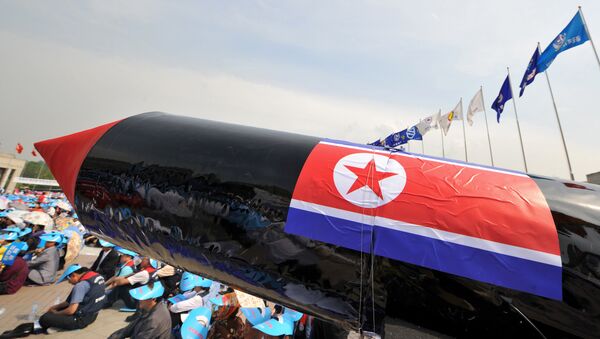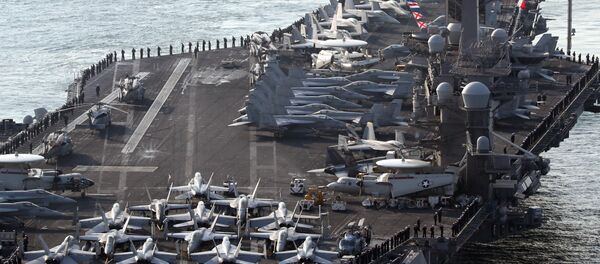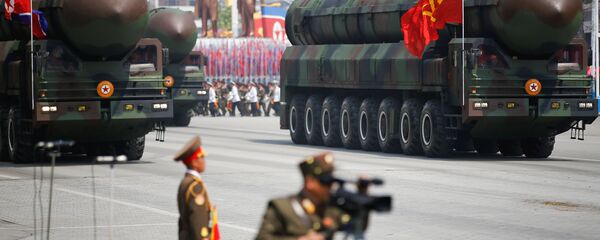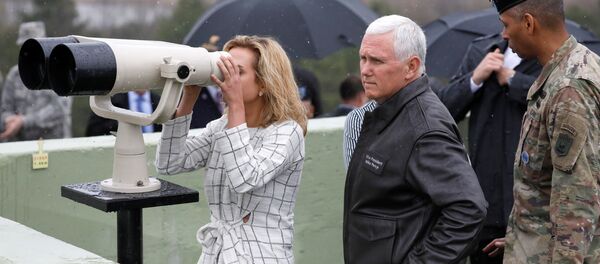On Tuesday, US Ambassador to the UN Nikki Haley told reporters that her country has "one message" to Pyongyang – that the United States would not be looking to get into a fight with North Korea, unless Pyongyang instigates one.
The same day, US media reported that the USS Carl Vinson supercarrier and its strike group had not reached the Sea of Japan, its slated destination, because the White House and the Pentagon had failed to communicate effectively. Instead, Navy photos showed that that the group was heading in another direction entirely, toward Australia.
Over the weekend, North Korea held a massive military parade in Pyongyang, celebrating the birth of country founder Kim Il Sung, and was thought to have carried out a missile test, reported to have failed.
Speaking to Radio Sputnik about this dramatic pattern of spiking and falling tensions, Michael Madden, Korea expert and visiting scholar at the US-Korea Institute at the School for Advanced International Studies at Johns Hopkins University, said that a lot of it has to do with media hype.
Madden recalled that at the moment, "the United States and South Korea are doing some joint exercises, which they do every year. In terms of what happened last week with the Carl Vinson, it seems that there might have been a miscommunication between Washington and the carrier strike group."
"I think the more critical point here is that a lot of the war rumors that were going around last week are a result more of misleading [reporting] in the US media, and a lot of very loud speculation just based on North Korean and US rhetoric," the analyst added.
"I think what we have to contrast this with the Obama administration; the Obama administration sort of repetitively talked about North Korea denuclearizing and not being provocative," etc. Today, by contrast, "the United States' rhetoric is sort of putting an ambiguous military option at the front of their talking points, and I think that's where we're getting into this sort of tension."
In reality, Madden noted that he doesn't really believe "that if North Korea does something on its own sovereign territory, the United States is going to attack them."
"There are two kinds of missile tests: one is where they do a missile drill from their east coast, and another is where they use mobile missiles and launch them over North Korean territory" from the western part of the country, "and they drop down in North Korea's waters, again off its east coast. It will be very difficult for the United States to shoot down a missile in that second type of drill."
Asked to comment on the report that Sunday's missile test may have failed due to active US sabotage efforts, Madden said that it's actually very difficult to get a sense of what's really going on, given whose making the claims.
"We're taking a lot of observations that are coming from the United States and South Korea about these missile test failures," the expert noted. "On Sunday, for all we know, North Korea may well have conducted rocket engine testing or something like that."
Furthermore, "this had been something that the United States had done with Iran's missile program, and I think that's where a lot of this stuff about North Korea and computer viruses and the like comes from. But we actually just do not know. A lot of this stuff is based on anonymous sourcing, and anonymous leaking…"
Asked what the future holds for the US-North Korean dispute, the observer hinted that he was actually pretty confident that the two sides can come to some sort of agreement. "This might just be setting the stage for some type of negotiation to take place. A lot of other media reporting has focused on that – on Xi Jinping meeting with President Trump in Florida, and that's one of the options that the Chinese put to the United States. I think a lot of what we're seeing now might be setting the stage for that."
Ultimately, Madden suggested that the best thing to do would be to avoid listening to sensationalized and overhyped media speculation having to do with the US-North Korean diplomatic conflict.
"Not to be too distasteful about this, but I think if some other international incident or even a domestic incident in the United States hit the media headlines, all of a sudden some of this stuff might just disappear. That's my general career experience with North Korea/United States [conflict]. Sometimes this stuff just seems to fall by the wayside due to other things [happening] in the world," and the media shifting its gaze accordingly.







